Unit 4 单元综合复习课件 (人教版英语八年级下册Unit 4 Why don't you talk to your parents?)
文档属性
| 名称 | Unit 4 单元综合复习课件 (人教版英语八年级下册Unit 4 Why don't you talk to your parents?) |  | |
| 格式 | pptx | ||
| 文件大小 | 35.0MB | ||
| 资源类型 | 试卷 | ||
| 版本资源 | 人教新目标(Go for it)版 | ||
| 科目 | 英语 | ||
| 更新时间 | 2024-06-03 07:03:32 | ||
图片预览

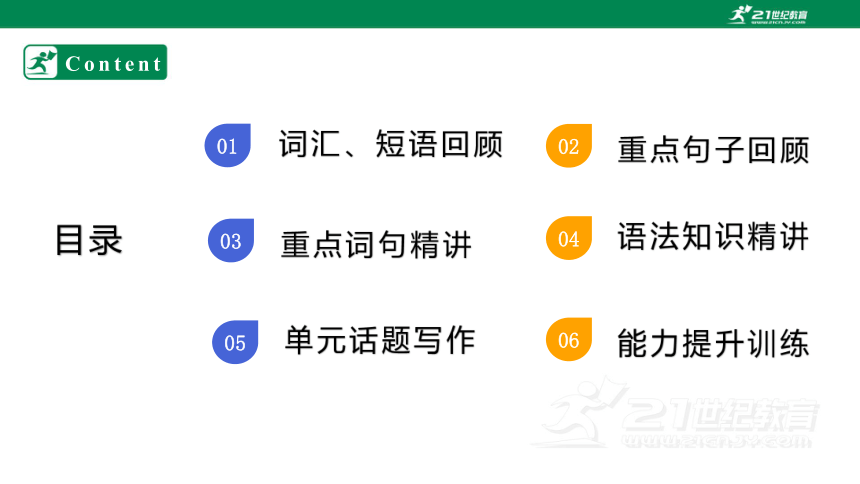

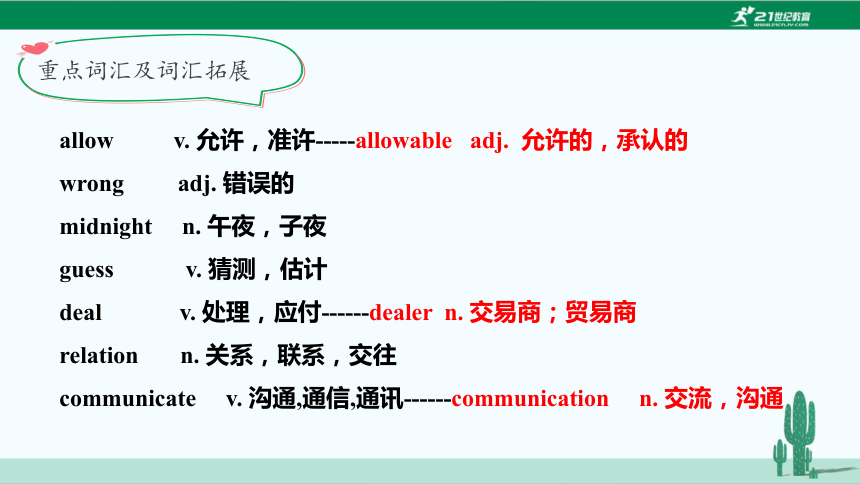
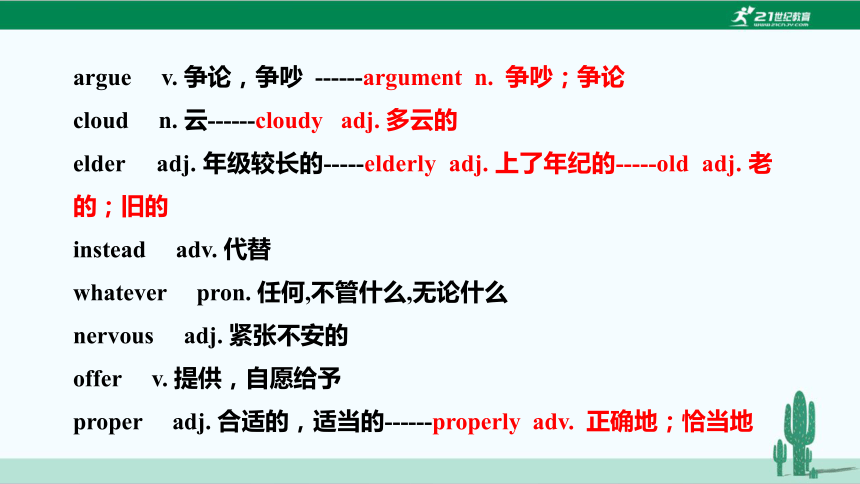
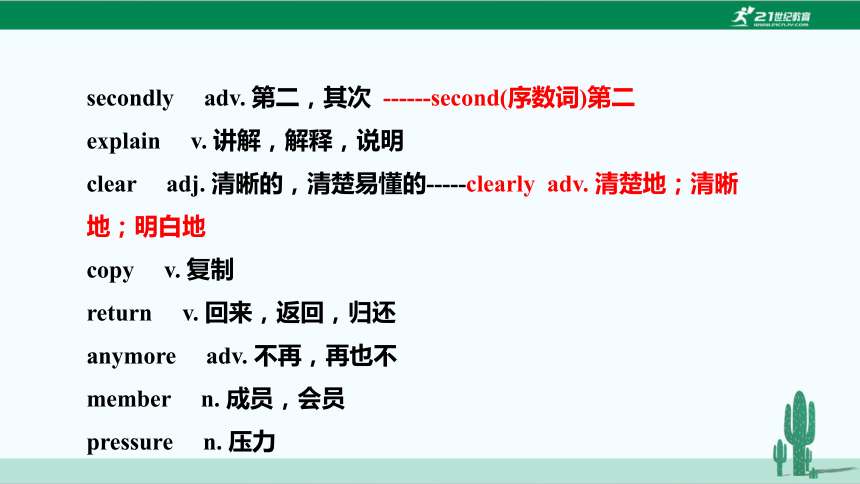
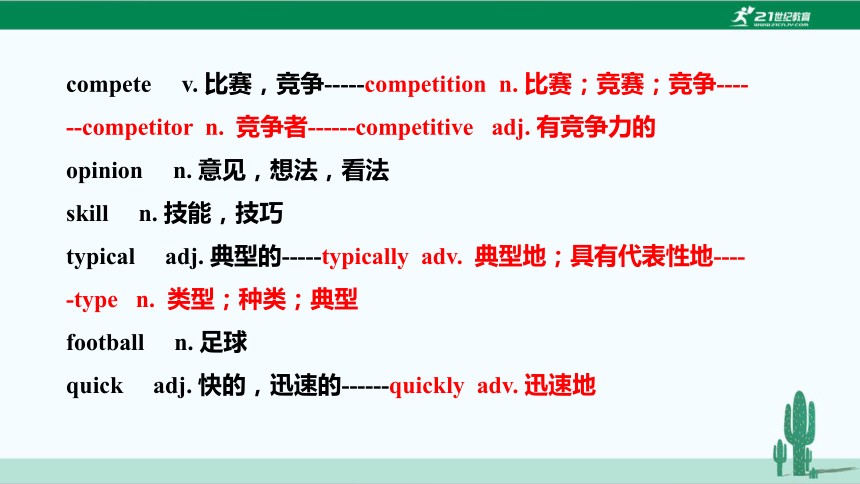
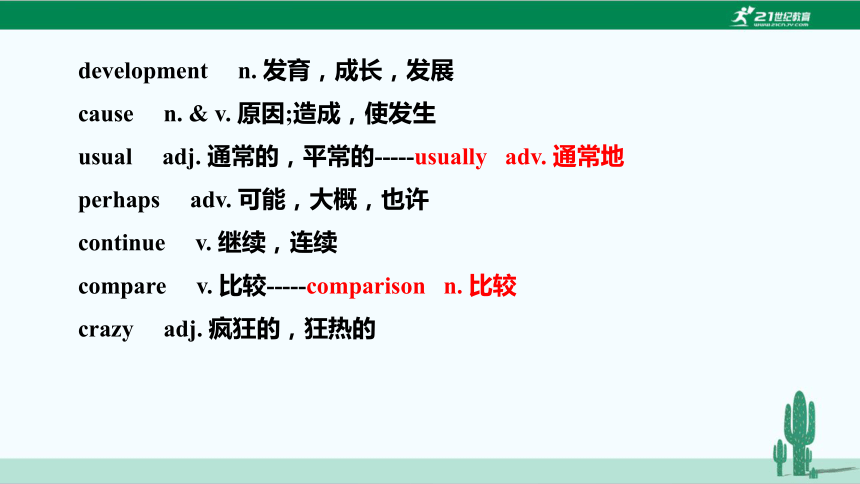
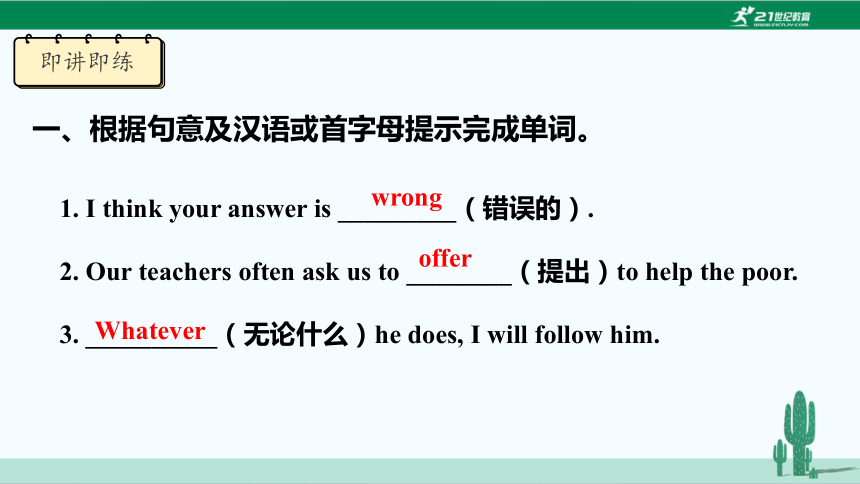
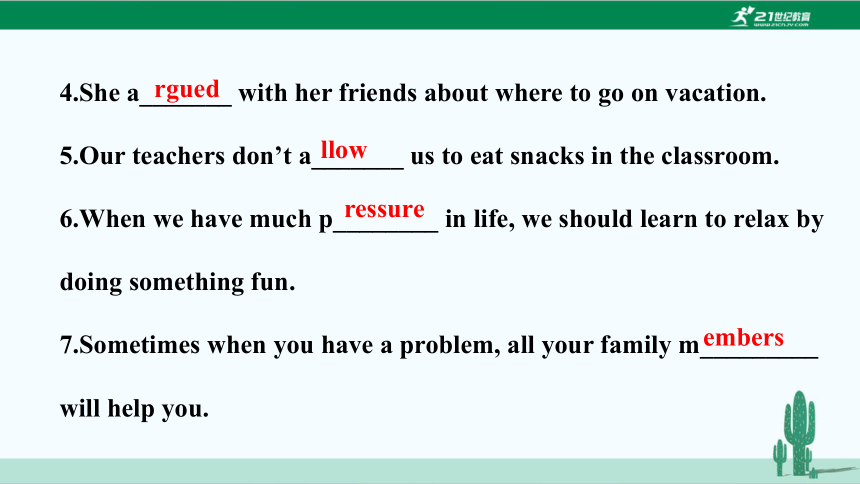
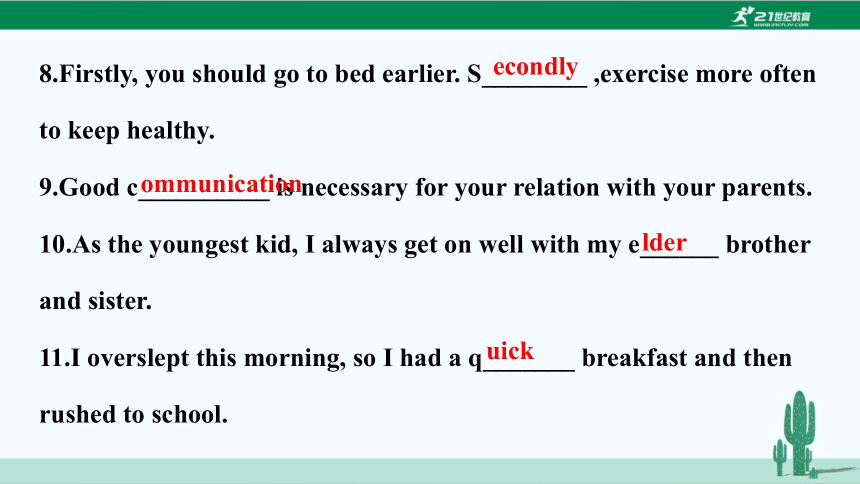
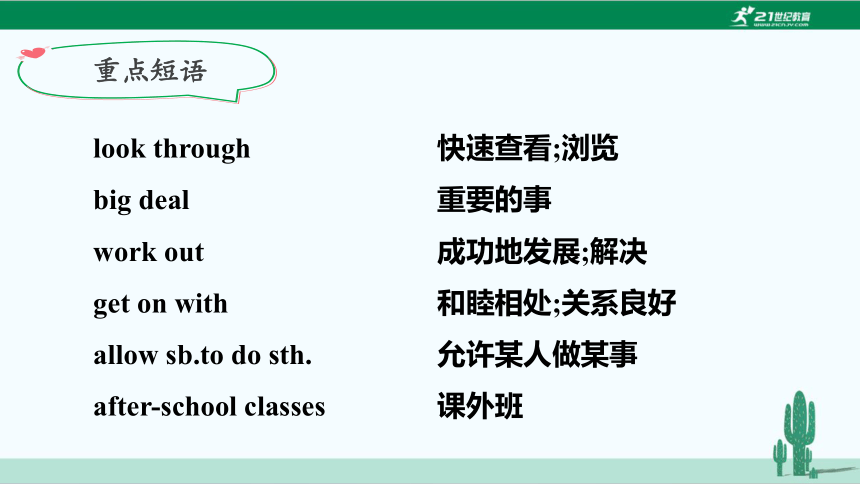
文档简介
(共73张PPT)
Unit 4 单元综合复习
人教版八年级下册
Content
词汇、短语回顾
01
重点句子回顾
02
重点词句精讲
03
语法知识精讲
04
单元话题写作
05
能力提升训练
06
目录
词汇、短语回顾
allow v. 允许,准许-----allowable adj. 允许的,承认的
wrong adj. 错误的
midnight n. 午夜,子夜
guess v. 猜测,估计
deal v. 处理,应付------dealer n. 交易商;贸易商
relation n. 关系,联系,交往
communicate v. 沟通,通信,通讯------communication n. 交流,沟通
重点词汇及词汇拓展
argue v. 争论,争吵 ------argument n. 争吵;争论
cloud n. 云------cloudy adj. 多云的
elder adj. 年级较长的-----elderly adj. 上了年纪的-----old adj. 老的;旧的
instead adv. 代替
whatever pron. 任何,不管什么,无论什么
nervous adj. 紧张不安的
offer v. 提供,自愿给予
proper adj. 合适的,适当的------properly adv. 正确地;恰当地
secondly adv. 第二,其次 ------second(序数词)第二
explain v. 讲解,解释,说明
clear adj. 清晰的,清楚易懂的-----clearly adv. 清楚地;清晰地;明白地
copy v. 复制
return v. 回来,返回,归还
anymore adv. 不再,再也不
member n. 成员,会员
pressure n. 压力
compete v. 比赛,竞争-----competition n. 比赛;竞赛;竞争------competitor n. 竞争者------competitive adj. 有竞争力的
opinion n. 意见,想法,看法
skill n. 技能,技巧
typical adj. 典型的-----typically adv. 典型地;具有代表性地-----type n. 类型;种类;典型
football n. 足球
quick adj. 快的,迅速的------quickly adv. 迅速地
development n. 发育,成长,发展
cause n. & v. 原因;造成,使发生
usual adj. 通常的,平常的-----usually adv. 通常地
perhaps adv. 可能,大概,也许
continue v. 继续,连续
compare v. 比较-----comparison n. 比较
crazy adj. 疯狂的,狂热的
一、根据句意及汉语或首字母提示完成单词。
即讲即练
1. I think your answer is _________(错误的).
2. Our teachers often ask us to ________(提出)to help the poor.
3. __________(无论什么)he does, I will follow him.
wrong
offer
Whatever
4.She a_______ with her friends about where to go on vacation.
5.Our teachers don’t a_______ us to eat snacks in the classroom.
6.When we have much p________ in life, we should learn to relax by doing something fun.
7.Sometimes when you have a problem, all your family m_________ will help you.
llow
ressure
embers
rgued
8.Firstly, you should go to bed earlier. S________ ,exercise more often to keep healthy.
9.Good c__________ is necessary for your relation with your parents.
10.As the youngest kid, I always get on well with my e______ brother and sister.
11.I overslept this morning, so I had a q_______ breakfast and then rushed to school.
econdly
ommunication
lder
uick
look through 快速查看;浏览
big deal 重要的事
work out 成功地发展;解决
get on with 和睦相处;关系良好
allow sb.to do sth. 允许某人做某事
after-school classes 课外班
重点短语
get into a fight 参与/卷入打架中
have a fight with... 与……打架
give sth.back 归还某物
mind sb.doing sth. 介意某人做某事
communicate with sb. 和某人交流
be afraid of... 害怕……
compare...with 比较;对比
compete with... 和……竞争
exam skills 考试技能
get into a good high school 上一所好高中
have a quick dinner 迅速地吃晚饭
push sb.so hard 把某人逼得太紧
cause a lot of stress 造成许多压力
speak in front of people 在众人面前发言
cut out 删除;删去
give sb.a lot of pressure 给某人施加很大压力
即讲即练
1.我和我的同学相处得很好。
I _____ ___ ____my classmates.
2.她拒绝和我一起参观博物馆。
She refused ____ ____ the museum with me.
3.你应该向你的朋友解释那件事。
You should ________ the matter _____ your friend.
一、根据汉语提示完成句子。
get on with
explain to
to visit
4.不要总是把他与别的孩子比较。
Don't always _________ _____ _____ other kids.
5.詹姆斯喜欢和他的朋友竞争。
James likes __________ _____ his friend.
6.不要给我太多压力。
Don't give me _____ ______ _________.
7.你为什么不给她打电话呢?
______ ______ you ______ her _____
Why don’t call up
compare him with
too much pressure
competing with
8.他们不允许我晚上独自外出。
They don't _______ _____ _____ _____ _____ alone at night.
9.说慢点让我听得见。
Speak slowly _____ _____ I can hear you.
10.我昨晚完成作业才睡觉。
I _____ go to bed _____ I finished my homework last night.
allow me to go out
so that
didn’t until
重点句子回顾
1. I studied until midnight last night so I didn't get enough sleep. 我昨晚学习到半夜所以睡眠不足。
2. Why don't you forget about it 你为什么不忘掉它呢?
3. Although she's wrong , it’s not a big deal. 虽然她错了,但这并不是什么大事儿。
4. He should talk to his friend so that he can say he's sorry.他应该跟朋友谈谈以便他能说声对不起。
5. Maybe you could go to his house. 也许你可以去他家。
6. I guess I could, but I don't want to surprise him. 我想我可以,但我不想让他感到惊讶。
重点词句精讲
1. allow
allow作动词,意为“允许”。用法如下:
(1)allow sth.意为“允许某事的发生”。例如:
I can’t allow such a thing.
我不允许发生这样的事。
(2)allow doing sth.意为“允许做某事”。例如:
We don’t allow eating in the classrooms.
我们不允许在教室吃饭。
We don’t allow smoking here.
我们不允许在此抽烟。
(3)allow sb. to do sth.意为“允许某人做某事”。例如:
Her father would not allow her to eat sweets.
她父亲不允许她吃糖果。
They don’t allow students to smoke in the classroom.
他们不允许学生在教室抽烟。
(4)allow sb. sth. 意为“给予某人某物(尤指钱或时间);让某人有(拥用或带有)某物”。例如:
He allows his son too much money.
他给他儿子的钱太多。
We’ll allow you time to answer.
我们将给你回答的时间。
2. get on with
get on意为“相处,进展”,也可用get along,其后接介词with。get on with sb. 意为“与某人和睦相处/关系良好”;get on well/badly with sth. 意为“某事进展顺利/不好”。例如:
He gets on (well) with his classmates.
他和同学们相处融洽。
How do you get on with your studies
你的学业进展如何?
【拓展】
get on 还有“上车”的意思,后面常接bus; train等表示交通工具的词;反义词为get off。例如:
The old man got on/ off the bus slowly.
那位老人慢慢地上/下了公共汽车。
3. argue
argue作动词,意为“争论,争吵”。常用短语为:
argue with sb. 与某人争吵
argue about/on sth. 争辩某事
argue for/against sth. 为赞成/反对某事而辩论
例如:Mrs. Brown argued with the waiter about the price of the meal.
布朗夫人因为那顿饭的价格跟服务员争吵。
Next class we’re arguing about family activities.
下节课我们辩论家庭活动。
argue对应的名词为argument,常用词组为:have an argument with sb. about/ on sth. 因某事与某人争论。例如:
I had an argument with my best friend last week.
上星期我与我最好的朋友吵了一架。
【拓展】argue与discuss的辨析:
(1)argue着重于自己的看法、立场,提出论据,以理说服他人。例如:There is no need arguing about the matter. 不必就此事辩论了。
(2)discuss重在交换意见,进行讨论,不含有说服对方的成分。例如:We’re going to discuss the question. 我们打算讨论这个问题。
4. instead
instead作副词,意为“代替,而不是”,常用作状语。例如:
He is tired. Let me go instead. 他累了,让我替他去吧。
She never studies. Instead, she plays tennis all day. 她从不学习,而是整天打网球。
【拓展】instead与instead of的辨析:
(1)instead是副词,后面不接其他的词,一般情况下可不译出,通常放在句首或句末,在句首时常用逗号隔开,表示前面的事没做,而做了后面的事。
例如:He didn’t go to school. Instead, he went to the cinema.
他没有去学校,相反他去了电影院。
(2)instead of是介词短语,意为“代替,而不是”,后面可以跟与前面并列成分相应的名词、代词、动词-ing形式等作为介词宾语。例如:
He went to the cinema instead of going to school.
他去了电影院而不是学校。
5. offer
(1)offer 作动词,意为“给予;提供;提出”。例如:
He offered me 300 dollars for that old car.
他出300美元向我买那辆旧车。
Offer some coffee to the guests.给客人端些咖啡来。
He offered me a cup of tea.他给了我一杯茶。
(2)offer to do sth. 表示“愿意做某事;主动提出做某事”。例如:
I offered to help my mother do housework.我主动提出帮助妈妈做家务。
She offered to drive me to the station.她表示愿意开车送我去车站。
6. explain
explain是动词,意为“解释,说明,阐明”。其用法如下:
(1)explain sth. to sb.意为“向某人解释某事”。例如:
Please explain that rule to me.请把这条规则给我讲一讲。
(2)“explain (to sb.) + 疑问词 + 从句”意为“向某人解释……”。例如:Please explain to me what this means.请向我解释这是什么意思。
(3)“explain + that从句” 意为“解释……”。例如:
He explained that we could no longer stay. 他解释说我们不能再待下去了。
7. compare
(1)compare作动词,意为“比较,对照”,常与with连用。例如:
Compare your answers with those at the back of the book to see if they are right.把你的答案同书后面的答案对照一下,看看是否正确。
My handwriting can not be compared with my father’s.
我的书法不能与我父亲的相比。
If you compare the two books, you will see that this one is better.
如果你比较一下这两本书,你会发现这一本好一些。
(2)compare作动词,还用作比喻意义,意为“比作”。例如:
Man’s life is often compared to a candle.人生常被比为蜡烛。
Shakespeare compared the world to a stage.莎士比亚把人世比作舞台。
8. push
push作动词,意为“推动;挤;鞭策;督促”。例如:
The little boy pushed the door open.小男孩把门推开了。
We had to push our way through the crowd.我们得从人群中挤过去
The math teacher really pushes his students. That’s why they don’t like him that much.那位数学老师确实对学生们鞭策过多了。这就是他们不那么喜欢他的原因。
You’d better not push me for an answer to your request.
你最好不要催促我答复你的请求。
9. Why don’t you talk to your parents?
“Why don’t you + 动词原形 + 其他?”相当于“Why not + 动词原形 + 其他?”意为“为什么不……?”并不表示疑问,而是作建议、询问。例如:Why don’t you go with us = Why not go with us
为什么不同我们一起去呢?
Why don’t you go swimming = Why not go swimming
为什么不去游泳呢?
【拓展】
why not用在口语中表示赞同,意为“当然,好啊”。例如:
— Let’s go to the movies. 我们看电影吧。
— Why not 好啊!
10. I’m really tired because I studied until midnight last night.
until意为“直到……”,有下列用法:
(1)作介词,后接时间名词,在句中作时间状语。例如:
She waited there until 9 o’clock. 她一直等到9点钟。
(2)作连词,后接从句,引导时间状语从句。例如:
We waited until the rain stopped. 我们等到雨停了。
【拓展】(1)until用在肯定句中,多与持续性的动词连用。如stand/wait/stay等,表示主句动作的终止时间。例如:
I will wait here until you come back.
我会在这里等到你回来。
(2)until可用于否定句中,即not…until…意为“直到……才”,常与非延续性动词连用。如open/start/leave/arrive等,强调主句动作开始的时间。例如:
The child didn’t go to bed until his father came back.
直到父亲回来,那个孩子才睡觉。
11. I’m not good at writing.
be good at意为“擅长……”,后接名词、代词或动词-ing形式。例如:
I’m good at playing chess. 我擅长下象棋。
We should be good at learning from each other.我们应该善于互相学习。
【拓展】
(1)be good for意为“对……有好处”。例如:
Eating more vegetables is good for your health.多吃蔬菜对你的健康有好处
(2)be good /kind /nice to意为“对……好”。例如:
My friend was good to me when I was ill.我生病时我的朋友对我关怀备至
12. Although she’s wrong, it’s not a big deal.
although作连词,相当于though,意为“尽管,虽然”,用来引导让步状语从句。它所引导的从句不能与并列连词but; and; so等连用,但可以和yet; still等词连用。例如:
Although he lives alone, he doesn’t feel lonely.
= He lives alone, but he doesn’t feel lonely.虽然他一个人住,但他并不感到孤独。
There is air all around us, although we cannot see it.
虽然我们看不见空气,但空气却存在于我们的周围。
【拓展】although与though的辨析:
(1)用作连词,表示“虽然”,二者可以互换使用,但although比though更为正式。例如:
Though/Although it was raining, we still went there.
虽然下着雨,但我们还是去了那里。
(2)although一般不用作副词,而though可用作副词,且一般放在句末(不放在句首),意为“可是,不过”。例如:
It’s hard work; I enjoy it, though. 工作很辛苦,可是我很喜欢。
We all tried our best. We lost the game, though. 我们都尽力最大努力,但我们还是输了。
(3)在as though(好像,仿佛),even though(即使,纵然)等固定短语中不能用although。例如:
He talks as though he knew everything. 他夸夸其谈,好像无所不知。
13. I hope things will be better for you soon.
hope作动词,意为“希望”,用于表示有可能实现的愿望,其后可接不定式或宾语从句,但表达“希望别人做某事”时则需用hope that从句
例如:I hope to watch the football match again.
我希望再看一次那场足球赛。
I hope you can pass the exam.我希望你能通过考试。
【拓展】hope与wish的辨析:
(1)表示“想;希望”,两者宾语可为to do,不能用doing。例如:
I hope/wish to visitGuilin. 我希望去桂林观光。
(2)wish后可以跟复合宾语,即wish sb. to do sth.,而hope不能。例如:I wish you to go. (正) 我希望你去。
I hope you to go. (误) 我希望你去。
(3)两者都可接that从句,但是“hope + that从句”表示希望,“wish + that从句”表示愿望,且从句的谓语动词要用虚拟语气。例如:
I hope you’ll be better soon. 我希望你很快好起来。
I wish I were really wealthy. 但愿我真的富有。
(4)wish后可接双宾语。hope没有这种用法。例如:
We wish you a happy New Year! 我们祝你新年快乐!
语法知识精讲
表达征求意见的句型用法
表达征求意见可以用以下句型:
Why don’t you…
What/How about+名词/动名词?
Why not+动词原形?
Could 和should 的用法
1. Why don’t you do sth. 为什么不...呢?
Why don’t we come more often
咱们为什么不经常来这里呢
Why don’t you buy a book for your father
给你爸爸买本书怎么样?
这个句子还可以写成Why not do…
Why not get her a camera
为什么不给她买个相机呢?
这个句型还有发出礼貌的邀请的用法。
Why don’t you have a drink of tea 请喝茶。
= Why not have a drink of tea
Why don’t you come with me
= Why not come with me
肯定回答:Good idea /OK /All right /Sounds good等。
否定回答:I’m afraid not / That’s too … /Sorry, I can’t等。
2. How/What about… 表示“……怎么样/好吗?”这个句型是询问听话这一方对某事物的看法或者意见。about是个介词,它后面要接名词或者doing。
e.g. How about his playing football 他足球踢得怎么样?
What about swimming with us 和我们一起游泳怎么样?
How about her English 她的英语怎样
How about … 和What about … 也可用于征求意见或提出建议,意为“……怎么样 ” ,about是介词,后可接名词、代词、V-ing形式。
如:
–– What about (having) another piece of bread
–– No, thanks. I’m full.
3. could和should都可以用来表示建议或劝 告,前者比后者在语气上更加婉转、客气。 could意为“可以” should意为“应该;应当”。
e.g.
— I need some money to pay for the summer camp.我需要些钱来支付(参加)夏令营的费用。
—You should / could borrow some money from your brother.
你应该/可以向你的哥哥借一些钱。
1) could的用法
Could是can的过去式,在比较委婉客气地提出
请求或陈述用法时,一般多用could,回答时用can,
例如:
— Could you please tell us where we show our tickets 你能告诉我们在哪里检票吗?
— Yes, I can.可以,我能。
2) should的用法
should是情态动同,它必须和其它动词一起构成谓语,没有人称和数的变化,表示劝告或建议,为“应该(当)”。例如:
—I have a very bad cold. 我得了重感冒。
—You should lie down, have a rest and drink more water. 你应该躺下休息,多喝水。
should作为情态动词,可以表示谦逊、客气、委婉之意。例如:
I should say that it would be better to try it again.
我倒是认为最好再试一试。
You are mistaken, I should say.
据我看,你搞错了。
He should expect their basketball team to win the
match. 他倒是希望他们的篮球队赢得这场比赛。
should还可以表示一种义务或责任,意为“应该”。如:
You should finish your homework before you play
games on the computer.
你应该先完成你的家庭作业,然后再玩电脑。
You should / could do …
意为“你应该可以做……”
除此外,下面这些句型也可以提建议
Let’s do … 意为“让我们做……吧!”
You’d better (not) do … 意为“你最好(不)做……”
It’s best to do ... 意为“做……再好不过了。”
Shall we do … 意为“我们做……好吗?”
单元话题写作
单元话题写作
单元写作目标
此单元的话题是“父母与子女之间的沟通”。写作通常以学生在与他人相处时所遇到的问题为切入点,引导学生通过沟通解决问题,学会与人和谐相处。
素材积累
开头句
1. I’m sorry to hear that you had an argument with your parents…
2. My mother is so busy with her work that she has little time to talk to me.
3. When I have trouble with my study, I don’t know how to get help.
4. I found it hard for me to get along well with people here. I really want to be a part of them.
中间句
1. If your opinions are different from your mother’s, you can communicate with her.
2. What’s more, we should have the heart-to-heart communication with our parents or friends around us.
3. It doesn’t matter whether or not you make mistakes. What matters most is to correct and learn from them.
结尾句
1. I hope things will be better for you soon.
2. I hope you will feel better about yourself.
3. I hope things work out.
范例
假定你是李华,最近你的笔友刘明发来邮件,向你诉说他的困扰:他的父母不让他用手机软件给英文电影配音(dub),认为那会影响他的学习和休息。请你根据邮件内容用英语给他回封邮件。
Dear Li Hua,
I’m in trouble now. Yesterday I argued with my parents because they didn’t allow me to dub foreign films by using mobile apps. They thought that it would have a bad influence on my study and sleep. I broke their hearts and made them angry. I’m sorry for that but I really think it helpful to learn English by dubbing the foreign films. Now I don’t know what to do. Could you help me
Yours,
Liu Ming
审题
1. 文体:应用文
2. 时态:一般现在时
3. 人称:第一人称
4. 要点提取:原因、建议等
Dear Liu Ming,
I’m sorry to hear that you had an argument with your parents for dubbing foreign films by using mobile apps.
I completely agree that it is a good way to learn English with interest. However, you shouldn’t make your parents angry, because they love you all the time. Don’t be so upset. Go straight to your parents and tell them you are sorry for that. Then, listen to your parents patiently, and you will knowtheir worries. At last, you can talk to your parents about the advantages of dubbing foreign films by using mobile apps.
I hope things will be better for you soon.
Yours,
Li Hua
能力提升训练
一、用括号内所给单词的适当形式填空。
1. There was an __________ (argue) happened between Tom and Jack last night.
2. Why don’t you sit down and _____________ (communication) with your brother
3. The teenagers have to work hard because of the _________ (press) from their parents.
argument
pressure
communicate
4. My ______ (old) brother is not very nice to me. He always refuses to help me.
5.They like__________ (hang) out with friends at weekends.
6.He spends an hour __________ (play) sports every day.
7.How about __________ (watch) movies tonight
8.The ______________ (communicate) between them is very successful.
watching
elder
hanging
communication
playing
二、单项填空
1.I plan to _____ a few parts of the article because it is too long.
A. cut out B. give out
C. look out D. find out
2.—Barry, how are you getting ______ with your classmates
—Very well. They are all my friends.
A. back B. up C. on D. out
A
C
3.Everyone had a different ______ on the subject at the meeting.
A. opinion B. advice C. decision D. discussion
4.After he _____ the book quickly, he told me something about it.
A. looked after B. turned on
C. turned downed D. looked through
A
D
5.It was a long time before I could get back into a car because I was very ______ about driving again after the accident.
A. excited B. nervous C. tired D. angry
6. —Mike found a new job.
—I hope this new job ______ well for him.
A. runs out B. works out
C. finds out D. brings out
B
B
三、书面表达
良好的家庭关系对青少年的健康成长很重要。但在现实生活中,不少孩子和父母之间缺乏必要的沟通和交流。作为晚辈,我们应该如何和父母友好相处呢?请根据下面的提示,以“How to Get On with Parents”为题写一篇80词左右的文章。(文章开头已给出,不计入总词数)。
How to Get On with Parents
For teenagers, it’s important to get on with parents. What should we do
________________________________________________________________________________________________________________________________________________________________________________________________
与父母友好相处的要点
①主动交流:每天花些时间,与父母谈谈老师、同学和学校的事
②主动帮忙:每周至少做两次家务活,比如整理房间、洗碗等
③讨论问题:遇事多与父母讨论,他们会帮你更好地解决问题
(提示词:spend communicate housework problem discuss)
How to Get On with Parents
For teenagers, it’s important to get on with parents. What should we do
Firstly, we should spend some time communicating with our parents. For example, we may talk about our teachers, classmates or the things that happen in school. Secondly, we should do something with our parents each week, such as making dinner or going shopping. We’ll improve our relationship with them in this way. Thirdly, we’d better discuss our problems with them. They will help us find better ways to solve them.
It’s not easy to get on with parents. So we should learn to be understanding first.
【参考范文】
谢谢
21世纪教育网(www.21cnjy.com)
中小学教育资源网站
兼职招聘:
https://www.21cnjy.com/recruitment/home/admin
Unit 4 单元综合复习
人教版八年级下册
Content
词汇、短语回顾
01
重点句子回顾
02
重点词句精讲
03
语法知识精讲
04
单元话题写作
05
能力提升训练
06
目录
词汇、短语回顾
allow v. 允许,准许-----allowable adj. 允许的,承认的
wrong adj. 错误的
midnight n. 午夜,子夜
guess v. 猜测,估计
deal v. 处理,应付------dealer n. 交易商;贸易商
relation n. 关系,联系,交往
communicate v. 沟通,通信,通讯------communication n. 交流,沟通
重点词汇及词汇拓展
argue v. 争论,争吵 ------argument n. 争吵;争论
cloud n. 云------cloudy adj. 多云的
elder adj. 年级较长的-----elderly adj. 上了年纪的-----old adj. 老的;旧的
instead adv. 代替
whatever pron. 任何,不管什么,无论什么
nervous adj. 紧张不安的
offer v. 提供,自愿给予
proper adj. 合适的,适当的------properly adv. 正确地;恰当地
secondly adv. 第二,其次 ------second(序数词)第二
explain v. 讲解,解释,说明
clear adj. 清晰的,清楚易懂的-----clearly adv. 清楚地;清晰地;明白地
copy v. 复制
return v. 回来,返回,归还
anymore adv. 不再,再也不
member n. 成员,会员
pressure n. 压力
compete v. 比赛,竞争-----competition n. 比赛;竞赛;竞争------competitor n. 竞争者------competitive adj. 有竞争力的
opinion n. 意见,想法,看法
skill n. 技能,技巧
typical adj. 典型的-----typically adv. 典型地;具有代表性地-----type n. 类型;种类;典型
football n. 足球
quick adj. 快的,迅速的------quickly adv. 迅速地
development n. 发育,成长,发展
cause n. & v. 原因;造成,使发生
usual adj. 通常的,平常的-----usually adv. 通常地
perhaps adv. 可能,大概,也许
continue v. 继续,连续
compare v. 比较-----comparison n. 比较
crazy adj. 疯狂的,狂热的
一、根据句意及汉语或首字母提示完成单词。
即讲即练
1. I think your answer is _________(错误的).
2. Our teachers often ask us to ________(提出)to help the poor.
3. __________(无论什么)he does, I will follow him.
wrong
offer
Whatever
4.She a_______ with her friends about where to go on vacation.
5.Our teachers don’t a_______ us to eat snacks in the classroom.
6.When we have much p________ in life, we should learn to relax by doing something fun.
7.Sometimes when you have a problem, all your family m_________ will help you.
llow
ressure
embers
rgued
8.Firstly, you should go to bed earlier. S________ ,exercise more often to keep healthy.
9.Good c__________ is necessary for your relation with your parents.
10.As the youngest kid, I always get on well with my e______ brother and sister.
11.I overslept this morning, so I had a q_______ breakfast and then rushed to school.
econdly
ommunication
lder
uick
look through 快速查看;浏览
big deal 重要的事
work out 成功地发展;解决
get on with 和睦相处;关系良好
allow sb.to do sth. 允许某人做某事
after-school classes 课外班
重点短语
get into a fight 参与/卷入打架中
have a fight with... 与……打架
give sth.back 归还某物
mind sb.doing sth. 介意某人做某事
communicate with sb. 和某人交流
be afraid of... 害怕……
compare...with 比较;对比
compete with... 和……竞争
exam skills 考试技能
get into a good high school 上一所好高中
have a quick dinner 迅速地吃晚饭
push sb.so hard 把某人逼得太紧
cause a lot of stress 造成许多压力
speak in front of people 在众人面前发言
cut out 删除;删去
give sb.a lot of pressure 给某人施加很大压力
即讲即练
1.我和我的同学相处得很好。
I _____ ___ ____my classmates.
2.她拒绝和我一起参观博物馆。
She refused ____ ____ the museum with me.
3.你应该向你的朋友解释那件事。
You should ________ the matter _____ your friend.
一、根据汉语提示完成句子。
get on with
explain to
to visit
4.不要总是把他与别的孩子比较。
Don't always _________ _____ _____ other kids.
5.詹姆斯喜欢和他的朋友竞争。
James likes __________ _____ his friend.
6.不要给我太多压力。
Don't give me _____ ______ _________.
7.你为什么不给她打电话呢?
______ ______ you ______ her _____
Why don’t call up
compare him with
too much pressure
competing with
8.他们不允许我晚上独自外出。
They don't _______ _____ _____ _____ _____ alone at night.
9.说慢点让我听得见。
Speak slowly _____ _____ I can hear you.
10.我昨晚完成作业才睡觉。
I _____ go to bed _____ I finished my homework last night.
allow me to go out
so that
didn’t until
重点句子回顾
1. I studied until midnight last night so I didn't get enough sleep. 我昨晚学习到半夜所以睡眠不足。
2. Why don't you forget about it 你为什么不忘掉它呢?
3. Although she's wrong , it’s not a big deal. 虽然她错了,但这并不是什么大事儿。
4. He should talk to his friend so that he can say he's sorry.他应该跟朋友谈谈以便他能说声对不起。
5. Maybe you could go to his house. 也许你可以去他家。
6. I guess I could, but I don't want to surprise him. 我想我可以,但我不想让他感到惊讶。
重点词句精讲
1. allow
allow作动词,意为“允许”。用法如下:
(1)allow sth.意为“允许某事的发生”。例如:
I can’t allow such a thing.
我不允许发生这样的事。
(2)allow doing sth.意为“允许做某事”。例如:
We don’t allow eating in the classrooms.
我们不允许在教室吃饭。
We don’t allow smoking here.
我们不允许在此抽烟。
(3)allow sb. to do sth.意为“允许某人做某事”。例如:
Her father would not allow her to eat sweets.
她父亲不允许她吃糖果。
They don’t allow students to smoke in the classroom.
他们不允许学生在教室抽烟。
(4)allow sb. sth. 意为“给予某人某物(尤指钱或时间);让某人有(拥用或带有)某物”。例如:
He allows his son too much money.
他给他儿子的钱太多。
We’ll allow you time to answer.
我们将给你回答的时间。
2. get on with
get on意为“相处,进展”,也可用get along,其后接介词with。get on with sb. 意为“与某人和睦相处/关系良好”;get on well/badly with sth. 意为“某事进展顺利/不好”。例如:
He gets on (well) with his classmates.
他和同学们相处融洽。
How do you get on with your studies
你的学业进展如何?
【拓展】
get on 还有“上车”的意思,后面常接bus; train等表示交通工具的词;反义词为get off。例如:
The old man got on/ off the bus slowly.
那位老人慢慢地上/下了公共汽车。
3. argue
argue作动词,意为“争论,争吵”。常用短语为:
argue with sb. 与某人争吵
argue about/on sth. 争辩某事
argue for/against sth. 为赞成/反对某事而辩论
例如:Mrs. Brown argued with the waiter about the price of the meal.
布朗夫人因为那顿饭的价格跟服务员争吵。
Next class we’re arguing about family activities.
下节课我们辩论家庭活动。
argue对应的名词为argument,常用词组为:have an argument with sb. about/ on sth. 因某事与某人争论。例如:
I had an argument with my best friend last week.
上星期我与我最好的朋友吵了一架。
【拓展】argue与discuss的辨析:
(1)argue着重于自己的看法、立场,提出论据,以理说服他人。例如:There is no need arguing about the matter. 不必就此事辩论了。
(2)discuss重在交换意见,进行讨论,不含有说服对方的成分。例如:We’re going to discuss the question. 我们打算讨论这个问题。
4. instead
instead作副词,意为“代替,而不是”,常用作状语。例如:
He is tired. Let me go instead. 他累了,让我替他去吧。
She never studies. Instead, she plays tennis all day. 她从不学习,而是整天打网球。
【拓展】instead与instead of的辨析:
(1)instead是副词,后面不接其他的词,一般情况下可不译出,通常放在句首或句末,在句首时常用逗号隔开,表示前面的事没做,而做了后面的事。
例如:He didn’t go to school. Instead, he went to the cinema.
他没有去学校,相反他去了电影院。
(2)instead of是介词短语,意为“代替,而不是”,后面可以跟与前面并列成分相应的名词、代词、动词-ing形式等作为介词宾语。例如:
He went to the cinema instead of going to school.
他去了电影院而不是学校。
5. offer
(1)offer 作动词,意为“给予;提供;提出”。例如:
He offered me 300 dollars for that old car.
他出300美元向我买那辆旧车。
Offer some coffee to the guests.给客人端些咖啡来。
He offered me a cup of tea.他给了我一杯茶。
(2)offer to do sth. 表示“愿意做某事;主动提出做某事”。例如:
I offered to help my mother do housework.我主动提出帮助妈妈做家务。
She offered to drive me to the station.她表示愿意开车送我去车站。
6. explain
explain是动词,意为“解释,说明,阐明”。其用法如下:
(1)explain sth. to sb.意为“向某人解释某事”。例如:
Please explain that rule to me.请把这条规则给我讲一讲。
(2)“explain (to sb.) + 疑问词 + 从句”意为“向某人解释……”。例如:Please explain to me what this means.请向我解释这是什么意思。
(3)“explain + that从句” 意为“解释……”。例如:
He explained that we could no longer stay. 他解释说我们不能再待下去了。
7. compare
(1)compare作动词,意为“比较,对照”,常与with连用。例如:
Compare your answers with those at the back of the book to see if they are right.把你的答案同书后面的答案对照一下,看看是否正确。
My handwriting can not be compared with my father’s.
我的书法不能与我父亲的相比。
If you compare the two books, you will see that this one is better.
如果你比较一下这两本书,你会发现这一本好一些。
(2)compare作动词,还用作比喻意义,意为“比作”。例如:
Man’s life is often compared to a candle.人生常被比为蜡烛。
Shakespeare compared the world to a stage.莎士比亚把人世比作舞台。
8. push
push作动词,意为“推动;挤;鞭策;督促”。例如:
The little boy pushed the door open.小男孩把门推开了。
We had to push our way through the crowd.我们得从人群中挤过去
The math teacher really pushes his students. That’s why they don’t like him that much.那位数学老师确实对学生们鞭策过多了。这就是他们不那么喜欢他的原因。
You’d better not push me for an answer to your request.
你最好不要催促我答复你的请求。
9. Why don’t you talk to your parents?
“Why don’t you + 动词原形 + 其他?”相当于“Why not + 动词原形 + 其他?”意为“为什么不……?”并不表示疑问,而是作建议、询问。例如:Why don’t you go with us = Why not go with us
为什么不同我们一起去呢?
Why don’t you go swimming = Why not go swimming
为什么不去游泳呢?
【拓展】
why not用在口语中表示赞同,意为“当然,好啊”。例如:
— Let’s go to the movies. 我们看电影吧。
— Why not 好啊!
10. I’m really tired because I studied until midnight last night.
until意为“直到……”,有下列用法:
(1)作介词,后接时间名词,在句中作时间状语。例如:
She waited there until 9 o’clock. 她一直等到9点钟。
(2)作连词,后接从句,引导时间状语从句。例如:
We waited until the rain stopped. 我们等到雨停了。
【拓展】(1)until用在肯定句中,多与持续性的动词连用。如stand/wait/stay等,表示主句动作的终止时间。例如:
I will wait here until you come back.
我会在这里等到你回来。
(2)until可用于否定句中,即not…until…意为“直到……才”,常与非延续性动词连用。如open/start/leave/arrive等,强调主句动作开始的时间。例如:
The child didn’t go to bed until his father came back.
直到父亲回来,那个孩子才睡觉。
11. I’m not good at writing.
be good at意为“擅长……”,后接名词、代词或动词-ing形式。例如:
I’m good at playing chess. 我擅长下象棋。
We should be good at learning from each other.我们应该善于互相学习。
【拓展】
(1)be good for意为“对……有好处”。例如:
Eating more vegetables is good for your health.多吃蔬菜对你的健康有好处
(2)be good /kind /nice to意为“对……好”。例如:
My friend was good to me when I was ill.我生病时我的朋友对我关怀备至
12. Although she’s wrong, it’s not a big deal.
although作连词,相当于though,意为“尽管,虽然”,用来引导让步状语从句。它所引导的从句不能与并列连词but; and; so等连用,但可以和yet; still等词连用。例如:
Although he lives alone, he doesn’t feel lonely.
= He lives alone, but he doesn’t feel lonely.虽然他一个人住,但他并不感到孤独。
There is air all around us, although we cannot see it.
虽然我们看不见空气,但空气却存在于我们的周围。
【拓展】although与though的辨析:
(1)用作连词,表示“虽然”,二者可以互换使用,但although比though更为正式。例如:
Though/Although it was raining, we still went there.
虽然下着雨,但我们还是去了那里。
(2)although一般不用作副词,而though可用作副词,且一般放在句末(不放在句首),意为“可是,不过”。例如:
It’s hard work; I enjoy it, though. 工作很辛苦,可是我很喜欢。
We all tried our best. We lost the game, though. 我们都尽力最大努力,但我们还是输了。
(3)在as though(好像,仿佛),even though(即使,纵然)等固定短语中不能用although。例如:
He talks as though he knew everything. 他夸夸其谈,好像无所不知。
13. I hope things will be better for you soon.
hope作动词,意为“希望”,用于表示有可能实现的愿望,其后可接不定式或宾语从句,但表达“希望别人做某事”时则需用hope that从句
例如:I hope to watch the football match again.
我希望再看一次那场足球赛。
I hope you can pass the exam.我希望你能通过考试。
【拓展】hope与wish的辨析:
(1)表示“想;希望”,两者宾语可为to do,不能用doing。例如:
I hope/wish to visitGuilin. 我希望去桂林观光。
(2)wish后可以跟复合宾语,即wish sb. to do sth.,而hope不能。例如:I wish you to go. (正) 我希望你去。
I hope you to go. (误) 我希望你去。
(3)两者都可接that从句,但是“hope + that从句”表示希望,“wish + that从句”表示愿望,且从句的谓语动词要用虚拟语气。例如:
I hope you’ll be better soon. 我希望你很快好起来。
I wish I were really wealthy. 但愿我真的富有。
(4)wish后可接双宾语。hope没有这种用法。例如:
We wish you a happy New Year! 我们祝你新年快乐!
语法知识精讲
表达征求意见的句型用法
表达征求意见可以用以下句型:
Why don’t you…
What/How about+名词/动名词?
Why not+动词原形?
Could 和should 的用法
1. Why don’t you do sth. 为什么不...呢?
Why don’t we come more often
咱们为什么不经常来这里呢
Why don’t you buy a book for your father
给你爸爸买本书怎么样?
这个句子还可以写成Why not do…
Why not get her a camera
为什么不给她买个相机呢?
这个句型还有发出礼貌的邀请的用法。
Why don’t you have a drink of tea 请喝茶。
= Why not have a drink of tea
Why don’t you come with me
= Why not come with me
肯定回答:Good idea /OK /All right /Sounds good等。
否定回答:I’m afraid not / That’s too … /Sorry, I can’t等。
2. How/What about… 表示“……怎么样/好吗?”这个句型是询问听话这一方对某事物的看法或者意见。about是个介词,它后面要接名词或者doing。
e.g. How about his playing football 他足球踢得怎么样?
What about swimming with us 和我们一起游泳怎么样?
How about her English 她的英语怎样
How about … 和What about … 也可用于征求意见或提出建议,意为“……怎么样 ” ,about是介词,后可接名词、代词、V-ing形式。
如:
–– What about (having) another piece of bread
–– No, thanks. I’m full.
3. could和should都可以用来表示建议或劝 告,前者比后者在语气上更加婉转、客气。 could意为“可以” should意为“应该;应当”。
e.g.
— I need some money to pay for the summer camp.我需要些钱来支付(参加)夏令营的费用。
—You should / could borrow some money from your brother.
你应该/可以向你的哥哥借一些钱。
1) could的用法
Could是can的过去式,在比较委婉客气地提出
请求或陈述用法时,一般多用could,回答时用can,
例如:
— Could you please tell us where we show our tickets 你能告诉我们在哪里检票吗?
— Yes, I can.可以,我能。
2) should的用法
should是情态动同,它必须和其它动词一起构成谓语,没有人称和数的变化,表示劝告或建议,为“应该(当)”。例如:
—I have a very bad cold. 我得了重感冒。
—You should lie down, have a rest and drink more water. 你应该躺下休息,多喝水。
should作为情态动词,可以表示谦逊、客气、委婉之意。例如:
I should say that it would be better to try it again.
我倒是认为最好再试一试。
You are mistaken, I should say.
据我看,你搞错了。
He should expect their basketball team to win the
match. 他倒是希望他们的篮球队赢得这场比赛。
should还可以表示一种义务或责任,意为“应该”。如:
You should finish your homework before you play
games on the computer.
你应该先完成你的家庭作业,然后再玩电脑。
You should / could do …
意为“你应该可以做……”
除此外,下面这些句型也可以提建议
Let’s do … 意为“让我们做……吧!”
You’d better (not) do … 意为“你最好(不)做……”
It’s best to do ... 意为“做……再好不过了。”
Shall we do … 意为“我们做……好吗?”
单元话题写作
单元话题写作
单元写作目标
此单元的话题是“父母与子女之间的沟通”。写作通常以学生在与他人相处时所遇到的问题为切入点,引导学生通过沟通解决问题,学会与人和谐相处。
素材积累
开头句
1. I’m sorry to hear that you had an argument with your parents…
2. My mother is so busy with her work that she has little time to talk to me.
3. When I have trouble with my study, I don’t know how to get help.
4. I found it hard for me to get along well with people here. I really want to be a part of them.
中间句
1. If your opinions are different from your mother’s, you can communicate with her.
2. What’s more, we should have the heart-to-heart communication with our parents or friends around us.
3. It doesn’t matter whether or not you make mistakes. What matters most is to correct and learn from them.
结尾句
1. I hope things will be better for you soon.
2. I hope you will feel better about yourself.
3. I hope things work out.
范例
假定你是李华,最近你的笔友刘明发来邮件,向你诉说他的困扰:他的父母不让他用手机软件给英文电影配音(dub),认为那会影响他的学习和休息。请你根据邮件内容用英语给他回封邮件。
Dear Li Hua,
I’m in trouble now. Yesterday I argued with my parents because they didn’t allow me to dub foreign films by using mobile apps. They thought that it would have a bad influence on my study and sleep. I broke their hearts and made them angry. I’m sorry for that but I really think it helpful to learn English by dubbing the foreign films. Now I don’t know what to do. Could you help me
Yours,
Liu Ming
审题
1. 文体:应用文
2. 时态:一般现在时
3. 人称:第一人称
4. 要点提取:原因、建议等
Dear Liu Ming,
I’m sorry to hear that you had an argument with your parents for dubbing foreign films by using mobile apps.
I completely agree that it is a good way to learn English with interest. However, you shouldn’t make your parents angry, because they love you all the time. Don’t be so upset. Go straight to your parents and tell them you are sorry for that. Then, listen to your parents patiently, and you will knowtheir worries. At last, you can talk to your parents about the advantages of dubbing foreign films by using mobile apps.
I hope things will be better for you soon.
Yours,
Li Hua
能力提升训练
一、用括号内所给单词的适当形式填空。
1. There was an __________ (argue) happened between Tom and Jack last night.
2. Why don’t you sit down and _____________ (communication) with your brother
3. The teenagers have to work hard because of the _________ (press) from their parents.
argument
pressure
communicate
4. My ______ (old) brother is not very nice to me. He always refuses to help me.
5.They like__________ (hang) out with friends at weekends.
6.He spends an hour __________ (play) sports every day.
7.How about __________ (watch) movies tonight
8.The ______________ (communicate) between them is very successful.
watching
elder
hanging
communication
playing
二、单项填空
1.I plan to _____ a few parts of the article because it is too long.
A. cut out B. give out
C. look out D. find out
2.—Barry, how are you getting ______ with your classmates
—Very well. They are all my friends.
A. back B. up C. on D. out
A
C
3.Everyone had a different ______ on the subject at the meeting.
A. opinion B. advice C. decision D. discussion
4.After he _____ the book quickly, he told me something about it.
A. looked after B. turned on
C. turned downed D. looked through
A
D
5.It was a long time before I could get back into a car because I was very ______ about driving again after the accident.
A. excited B. nervous C. tired D. angry
6. —Mike found a new job.
—I hope this new job ______ well for him.
A. runs out B. works out
C. finds out D. brings out
B
B
三、书面表达
良好的家庭关系对青少年的健康成长很重要。但在现实生活中,不少孩子和父母之间缺乏必要的沟通和交流。作为晚辈,我们应该如何和父母友好相处呢?请根据下面的提示,以“How to Get On with Parents”为题写一篇80词左右的文章。(文章开头已给出,不计入总词数)。
How to Get On with Parents
For teenagers, it’s important to get on with parents. What should we do
________________________________________________________________________________________________________________________________________________________________________________________________
与父母友好相处的要点
①主动交流:每天花些时间,与父母谈谈老师、同学和学校的事
②主动帮忙:每周至少做两次家务活,比如整理房间、洗碗等
③讨论问题:遇事多与父母讨论,他们会帮你更好地解决问题
(提示词:spend communicate housework problem discuss)
How to Get On with Parents
For teenagers, it’s important to get on with parents. What should we do
Firstly, we should spend some time communicating with our parents. For example, we may talk about our teachers, classmates or the things that happen in school. Secondly, we should do something with our parents each week, such as making dinner or going shopping. We’ll improve our relationship with them in this way. Thirdly, we’d better discuss our problems with them. They will help us find better ways to solve them.
It’s not easy to get on with parents. So we should learn to be understanding first.
【参考范文】
谢谢
21世纪教育网(www.21cnjy.com)
中小学教育资源网站
兼职招聘:
https://www.21cnjy.com/recruitment/home/admin
同课章节目录
- Unit 1 What's the matter?
- Section A
- Section B
- Unit 2 I'll help to clean up the city parks.
- Section A
- Section B
- Unit 3 Could you please clean your room?
- Section A
- Section B
- Unit 4 Why don't you talk to your parents?
- Section A
- Section B
- Unit 5 What were you doing when the rainstorm came
- Section A
- Section B
- Review of Units 1-5
- Unit 6 An old man tried to move the mountains.
- Section A
- Section B
- Unit 7 What's the highest mountain in the world?
- Section A
- Section B
- Unit 8 Have you read Treasure Island yet?
- Section A
- Section B
- Unit 9 Have you ever been to a museum?
- Section A
- Section B
- Unit 10 I've had this bike for three years.
- Section A
- Section B
